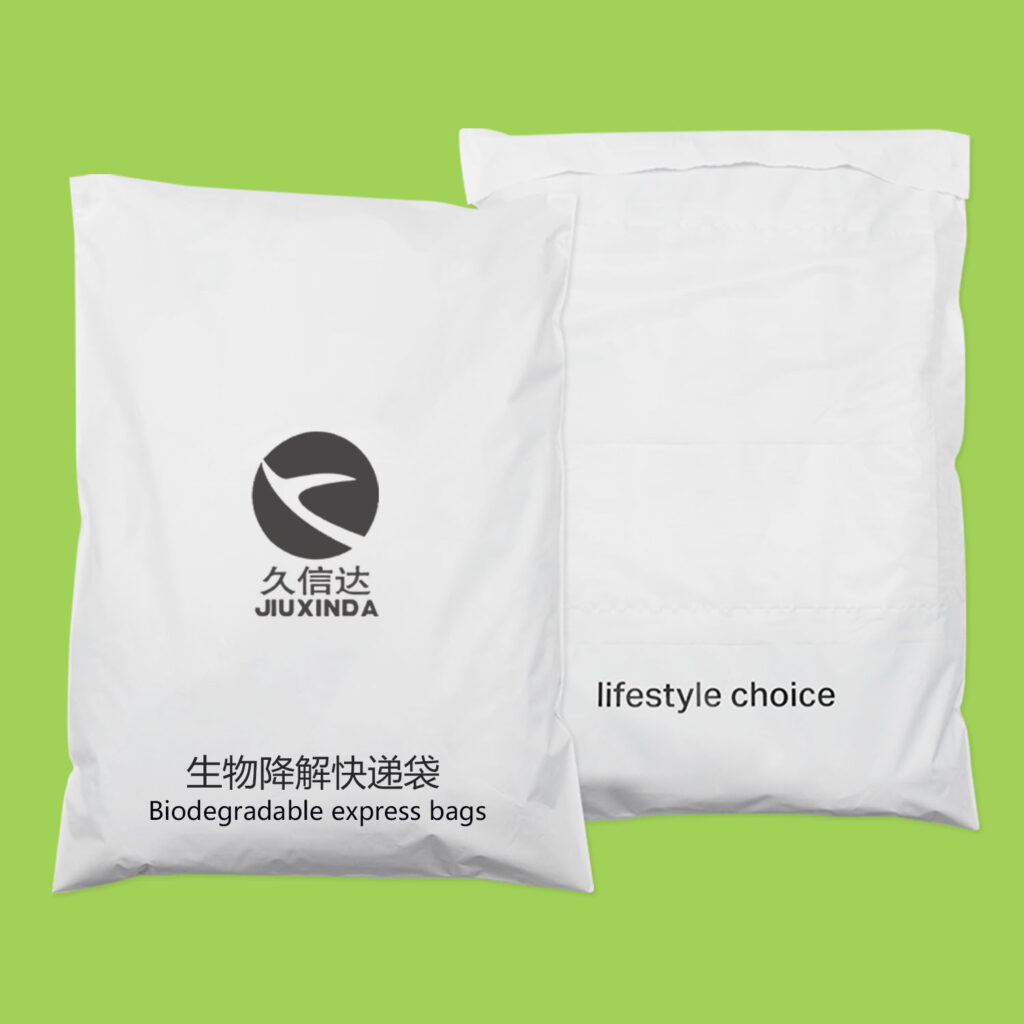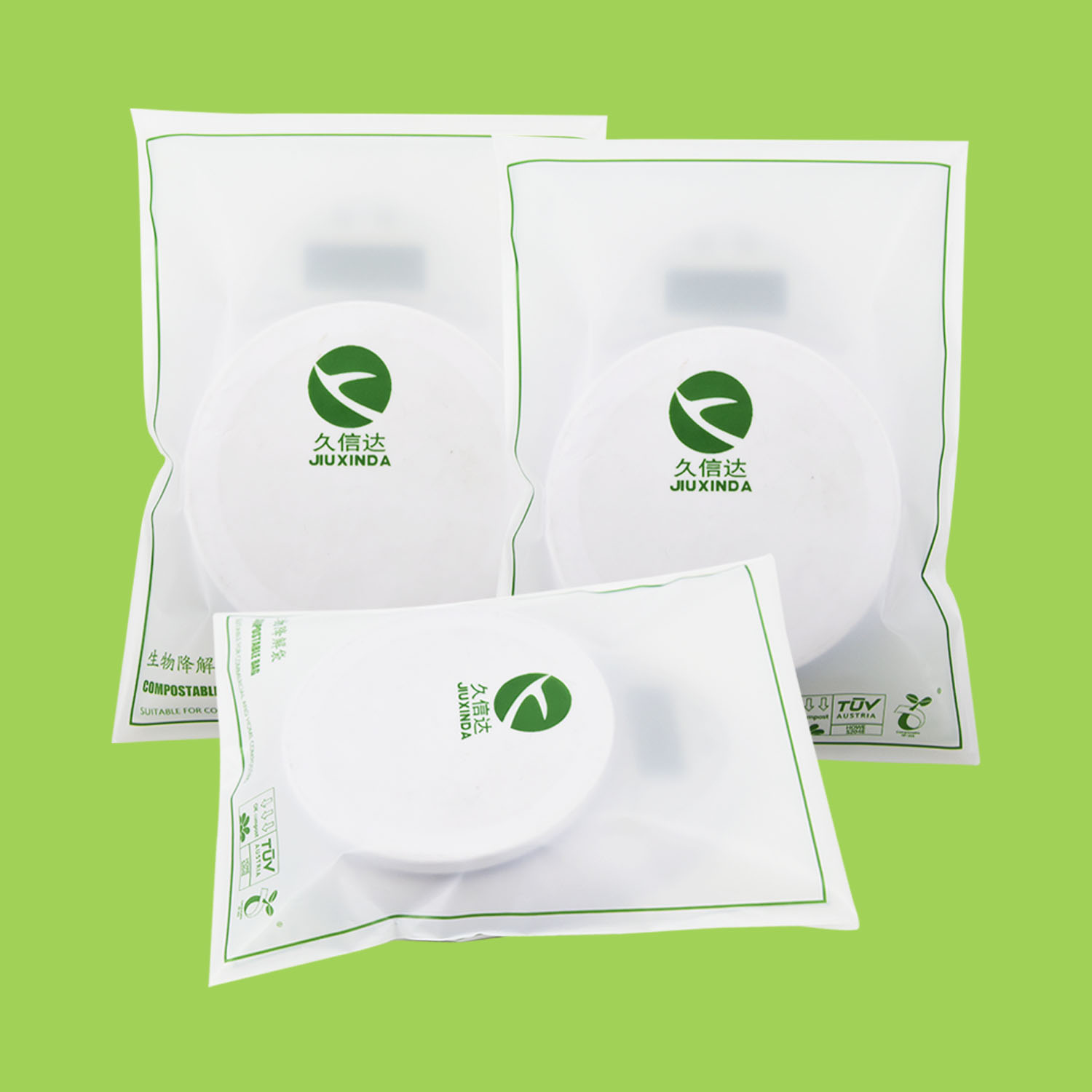Compostable Materials
Compostable bags are an eco-friendly choice. They are usually made from plant-based materials and can decompose naturally, reducing the impact on the environment. Here are some compostable materials that can be used to make bags:
- Polylactic acid (PLA): This is a bioplastic made from lactic acid from corn, sugar cane or other plant sources. It can be used to make most plastic products, including bags. PLA can decompose under industrial composting conditions, but may not be suitable for home composting conditions.
- Polybutylene succinate (Bio-PBS): This material is made from renewable resources such as corn, sugar, beet or cassava starch, and usually contains 50-60% bio-based components, which is suitable for home or industrial composting.
- Polyhydroxyalkanoate (PHA): This material is usually derived from renewable resources such as plant oils and starch. PHA is unique in that it can be designed to decompose in the marine environment, and some PHA materials have marine degradable certification from TUV. It is also suitable for home or industrial composting.
- Polybutylene terephthalate (PBAT): This is a polymer derived entirely from fossil fuels that biodegrades quickly and is often used as the base material for compostable retail/e-commerce packaging, such as mailing bags and plastic bags.
- Cellulose: This is a 100% plant-derived material used to make paper products, molded fibers, and can be used to make transparent films (cellophane).
- Corn starch: Corn starch is a durable and biodegradable plant-based material that can be used as an alternative to traditional plastic and polystyrene packaging.
- Mushroom packaging: Packaging made from the mycelium of mushrooms is 100% biodegradable and compostable and can be grown from food waste in a few weeks, making it a renewable resource.
- Seaweed: Seaweed can grow in fresh or salt water and does not require additional media. Its rich nutrients and fiber make it an ideal packaging material.
- Glassine: Made from wood pulp, it can be used for food contact, has oil and moisture resistance, and is also recyclable and compostable.
- Bioplastics: Some companies use bioplastics as an alternative to traditional plastic and polystyrene packaging. These bioplastics can be corn starch-based and can be composted after use.
When choosing these materials, it is important to ensure that the packaging bags can decompose under proper composting conditions and do not leave any toxic residues. In addition, the packaging materials should be easily recyclable or biodegradable to reduce the impact on the environment.
Compostable packaging bags
Packaging bags made of compostable materials can be applied to multiple industries to reduce the impact on the environment, especially those that come into contact with food or are used for a short period of time. Here are some types of packaging bags that can use compostable materials and their application industries:
- Biodegradable shopping bags: These bags are usually made of bio-based materials such as PLA, PBAT, PHA, etc., which can be decomposed under industrial composting conditions and are suitable for retail, supermarkets, and farmers’ markets.
- Food packaging bags: Compostable bags used to package food, such as bags produced by the BioBag brand for packaging sandwiches, snacks or leftovers, are suitable for food service and catering industries.
- Courier bags: Compostable mail bags for e-commerce can reduce the use of plastic in courier packaging and are suitable for online retailers and the logistics industry.
- Garbage bags: Compostable garbage bags for home and commercial use, designed to be compatible with home composting systems, suitable for residential and commercial waste disposal.
- Food storage bags: transparent block-bottom bags such as the Elevate brand for storing coffee or other food, suitable for the food and beverage industry.
- Agricultural bags: used to package agricultural products such as vegetables, fruits, etc., which can reduce the use of plastic in agricultural production.
- Industrial packaging: used to package heavy products or as protective packaging during transportation, suitable for manufacturing and industry.
- Retail and shopping bags: Compostable shopping bags for retail stores are designed to reduce the use of traditional plastic bags and are suitable for the retail industry.
- Environmentally friendly plastic bags: Plastic bags that are easily degraded in the natural environment after adding additives, suitable for various industries that need to reduce plastic pollution.
The use of packaging bags made of compostable materials can reduce plastic waste, promote a circular economy, and contribute to environmental protection. However, consumers and businesses also need to be aware of the best application scenarios for compostable materials and ensure that these materials are processed in appropriate composting facilities to achieve the expected environmental protection effects.

environmental impact
The impact of compostable materials on the environment is multifaceted, including positive and potential negative effects. Here are some key points:
- Positive impact: Compostable materials such as polylactic acid (PLA), polybutylene terephthalate (PBAT), polyhydroxyalkanoate (PHA), etc. can be completely degraded by microorganisms existing in nature under industrial composting conditions, converted into carbon dioxide (CO2), methane (CH4) and water (H2O), as well as mineralized inorganic salts of the elements contained.
- Reduce plastic pollution: Biodegradable plastic products can significantly reduce the risk of traditional plastics leaking into the environment in difficult-to-recycle plastic applications such as agricultural mulches, flocculants and water-soluble polymers, and are one of the important ways to prevent and control plastic pollution.
- Potential negative impact: If compostable plastics are only in household compost piles or landfills, they still take a long time to decompose and may not be effectively degraded, leading to environmental pollution.
- Degradation conditions: The degradation of compostable materials requires specific conditions, such as high temperature, humidity, oxygen, etc. These conditions may be difficult to achieve in the natural environment, thus affecting their degradation efficiency.
- Impact during the composting process: During the composting process, compostable plastic bags can accelerate the degradation of organic matter and increase the composting temperature, but they may also increase the emission of greenhouse gases (such as CH4 and CO2).
- Changes in microbial communities: The addition of compostable materials can change the richness and diversity of bacterial communities during the composting process, affecting the maturity and quality of the compost.
- Environmental risks: The degradation of compostable plastic bags may produce microplastics, which may pose a potential risk to the environment and human health.
- Policies and standards: With the continuous deepening of plastic pollution control policies, the biodegradable plastic industry has developed rapidly, but it also requires perfect standards and testing capabilities to ensure its environmental safety and controllability.
- Consumer awareness: It is very important to cultivate the public’s green and environmentally friendly living habits. The habit of discarding them at will cannot be formed because of the use of degradable plastic products.
- Scientific research needs: Further scientific research is needed to evaluate the environmental safety and controllability of degradable plastics, as well as to develop more effective recycling and reuse methods.
Compostable materials have a potential positive role in reducing plastic pollution, but at the same time, attention should be paid to their degradation conditions, environmental impacts and potential risks to ensure their positive impact on the environment.


